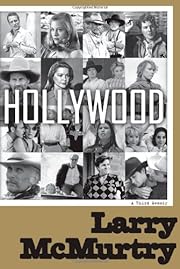

Click on a thumbnail to go to Google Books.
|
Loading... Hollywood: A Third Memoirby Larry McMurtry
 None No current Talk conversations about this book.   ) )This is not so much a memoir as it is anecdotes from McMurtry's movie experiences. They do not move smoothly from one story to another but jump around as thoughts do, and often result in something of a tangle. Still interesting reading and at 146 pages with some "chapters" being a page or even less, it can be read in an evening or two. I had to chuckle very often during the reading. It's an autobiography where he tells his life as a scriptwriter. It's more a kind of byline which brought him some necessary money to do his writing and especially bookselling. He tells with whom he was writing, about producer and the film industry, about sripts which lay around for years until the were used for a film or never had got a green light to be produced and about how fast he was/is writing his own novels. I had to chuckle very often during the reading. It's an autobiography where he tells his life as a scriptwriter. It's more a kind of byline which brought him some necessary money to do his writing and especially bookselling. He tells with whom he was writing, about producer and the film industry, about sripts which lay around for years until the were used for a film or never had got a green light to be produced and about how fast he was/is writing his own novels. Larry McMurtry has written more memoirs than most people have written letters home. I have just finished reading "Hollywood" (2010), the third of his literary memoirs, but he has written at least two other books, "Paradise" and "Walter Benjamin at the Dairy Queen," that might be termed memoirs, as well. As sketchy as these books are, the 77-year-old writer may still have a few more memoirs left to write. In "Hollywood," his recollections of his many years as a scriptwriter, McMurtry makes the surprising, at least to me, comment that he works "harder at screenwriting than I do at fiction -- fiction comes to me easily, and scripts don't. I have to work at them; they're a craft I've only partly mastered -- the character part." Much of McMurtry's fiction, like his memoirs, has an easy-going style, as if it were just poured onto a page. Even so, I would have thought any serious novel would be more difficult to write than any screenplay. True, scripts are often written by committee, with the director getting the final say about what actually goes into the movie, which must be frustrating for any scriptwriter. But this doesn't appear to be what McMurtry is talking about. Elsewhere in the book he recalls that after a heart attack in the 1990s, "I could write fiction, which doesn't really require a clear mind: it's a semivisceral experience ... No one can write screenplays in this trancelike state." Fiction doesn't require a clear mind? That seems revealing. I would love to hear other novelists comment on this observation. McMurtry says he's grateful to Hollywood because "it's essentially financed my fiction, my rare book business, and, to a huge degree, my adult life." Besides, he confesses, he just loves Hollywood and numbers actress Diane Keaton among his best friends. He hates movie sets, however, and makes a point to avoid them. Speaking of directors, he writes, "the kindest thing an author can do is stay out of the way and not slow them down." Another surprising thing in McMurtry's memoir is that he believes "Loop Group" a much better novel than "Lonesome Dove." I've read his Hollywood novel "Loop Group," and I enjoyed it, but it seemed slight to me, again as if it were written on the run, while I consider "Lonesome Dove" a masterpiece of western fiction. Most readers and not a few critics seem to feel the same way. It did win the Pulitzer Prize in 1985, while "Loop Group" went largely ignored. McMurtry could be right, however. I would love to read both of those novels again. Once again, this book delivered. This is an insider's look into screenwriting by someone who is very successful. It doesn't tell you how to break into the business, but how McMurtry did it. He refers to many actors, directors and other Hollywood somebodies that I recognized, which was pretty fun. He and Diane Keaton are...what? He says he loves her, so does he love her? He is too much of a gentleman to reveal anything. As a collection, the three books in this short series are excellent for not only the information they present, but for insight into this prolific and beloved author's life and mind. I really enjoyed them all. no reviews | add a review
Belongs to Series
In the third installment in a trilogy of memoirs, the screenwriter shares anecdotes about his time in Hollywood, from holding hands with Cybill Shepherd to watching Jennifer Garner's audition tape. No library descriptions found. |
Current DiscussionsNonePopular covers
 Google Books — Loading... Google Books — Loading...GenresMelvil Decimal System (DDC)808.2Literature Literature, rhetoric & criticism Rhetoric and collections of literary texts from more than two literatures Rhetoric of dramaLC ClassificationRatingAverage: (3.2) (3.2)
Is this you?Become a LibraryThing Author. |
||||||||||||||||||||||||||||||||||||||||||||||||||||||||||||||||||||||||||||||||||||||||||||||||||||||||||||||||||||||||